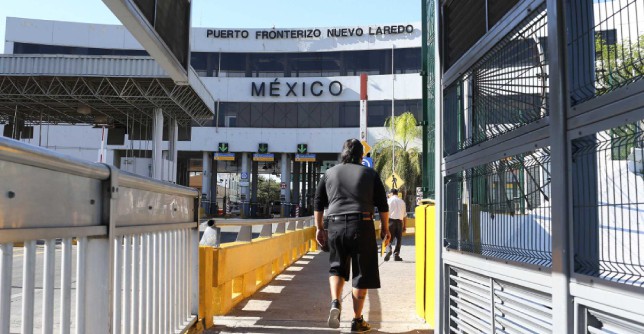President Trump walks back threat to close the southern border with Mexico, but CBP’s reallocation of officers to immigration duties continues to stymie cargo flows.
President Donald Trump on Thursday backed away from his threat last week to close the entire southern border, giving Mexico a “one-year warning” to gain control over the continued wave of Central American migrants crossing the country to the U.S. border.
While U.S. manufacturers felt relieved, they will continue to experience supply chain pains along the southern border with the ongoing deployment of up to 750 Customs and Border Protection officers from the ports of entry to assist the Border Patrol with immigration duties.
Delays for trucked cargo crossing the southern border ports of entry has increased in recent days. For example, at Laredo’s Bridge of the Americas on Thursday, the peak wait time for trucks was seven hours, compared to 50 minutes the same time last year, while at California’s Otay Mesa the wait time at the port of entry increased to about two hours compared to 35 minutes last year. CBP also has responded to the shortage of available officers at many smaller ports of entry along the southern border with truck lane reductions, as well as weekend day closures.
The National Customs Brokers and Forwarders Association of America said that during the hours that CBP cargo operations are closed at the southern border ports of entry, truckers are starting to line up, putting CBP behind schedule when the lanes reopen.
During a conference call with CBP on Thursday, trade representatives suggested that now is the time for the agency to allow companies to more fully benefit from their enrollment in programs such as Free and Secure Trade (FAST) and Customs Trade Partnership Against Terrorism (CTPAT). Companies enrolled in these trusted trader programs have demonstrated to CBP that they have met rigorous security protocols to receive less scrutiny of their shipments.
“These companies are essentially ‘known shippers’ — similar to TSA PreCheck. Such companies have been promised ‘fast-lane’ treatment,” said Peter Friedmann, executive director of the Washington, D.C.-based Agriculture Transportation Coalition. “Now is the time to implement: CBP should immediately dedicate lanes for the thousands of CTPAT-vetted companies. This would reduce processing time, increase security and expedite truck flow for legitimate commerce across the southern border.”
CBP told industry representatives on Thursday’s call that they’re doing their best to maintain those FAST and CTPAT benefits for the trade. However, Friedmann said his members have told him that the FAST lanes are currently “backed up all the way across the border.”
So far, rail shipments crossing the southern border have not been affected, since they require much less CBP staff oversight.
Meanwhile, CBP said “no narcotics exams will be sacrificed” at the southern border ports of entry.
On Wednesday, CBP officers at the Brownsville, Texas, port of entry stopped a 2008 Toyota Camry carrying 17.59 pounds of cocaine with a street value of $135,660, while at Laredo’s World Trade Bridge, CBP officers found 35 pounds of methamphetamines, with a street value of $701,944, inside a truck trailer containing wooden pedestals.










